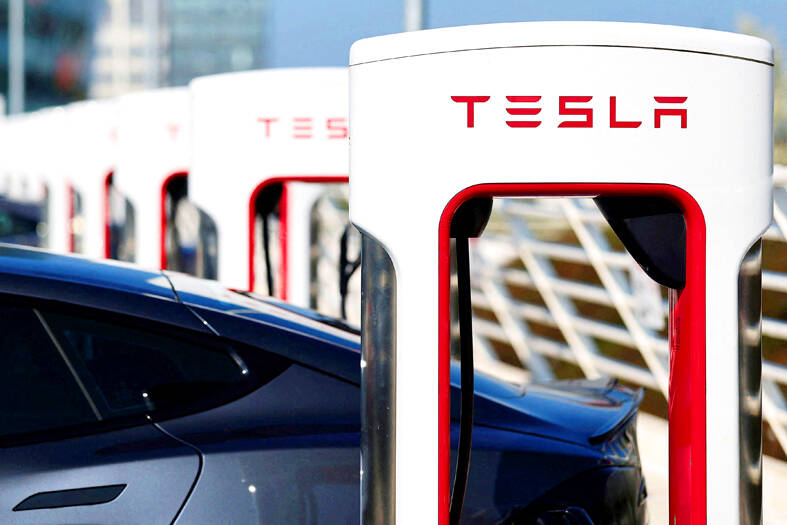Tesla Inc’s sales declined 13 percent year-on-year in the first three months of the year, another sign that Elon Musk’s once high-flying electric car company is struggling to attract buyers.
The double-digit drop is likely due to a combination of factors, including its aging lineup, competition from rivals and a backlash from Musk’s embrace of right wing politics. It also is a warning that the company’s first-quarter earnings report later this month could disappoint investors.
Tesla reported deliveries of 336,681 globally in the January to March quarter. The figure was down from sales of 387,000 in the same period a year ago. The decline came despite deep discounts, zero financing and other incentives.

Photo: Stephane Mahe, Reuters
Analysts polled by FactSet expected much higher deliveries of 408,000.
Wedbush Securities Inc analyst Dan Ives said in a note to clients that Tesla is seeing soft demand in the US and China, as well as facing pressure in Europe.
“The brand crisis issues are clearly having a negative impact on Tesla...there is no debate,” he said.
Ives said that Wall Street and analysts alike knew that the first-quarter figures were likely to be bad, but that it was even worse than expected.
“We are not going to look at these numbers with rose-colored glasses...they were a disaster on every metric,” he said.
Tesla’s stock has plunged by roughly half since hitting a mid-December record as expectations of a lighter regulatory touch and big profits with Donald Trump as US president were replaced by fear that the boycott of Musk’s cars and other problems could hit the company hard.
Analysts are still not sure exactly how much the fall in sales is due to the protests or other factors. Electric car sales have been sluggish in general, and Tesla in particular is suffering as car buyers hold off from buying its bestselling Model Y because of plans for an updated version later this year.
The Austin, Texas electric vehicle maker has also lost market share to rivals in recent months as their offerings improve, including those of BYD Co (). The Chinese electric vehicle giant last month unveiled a technology that allows it cars to charge up in just a few minutes.

In Italy’s storied gold-making hubs, jewelers are reworking their designs to trim gold content as they race to blunt the effect of record prices and appeal to shoppers watching their budgets. Gold prices hit a record high on Thursday, surging near US$5,600 an ounce, more than double a year ago as geopolitical concerns and jitters over trade pushed investors toward the safe-haven asset. The rally is putting undue pressure on small artisans as they face mounting demands from customers, including international brands, to produce cheaper items, from signature pieces to wedding rings, according to interviews with four independent jewelers in Italy’s main

Macronix International Co (旺宏), the world’s biggest NOR flash memory supplier, yesterday said it would spend NT$22 billion (US$699.1 million) on capacity expansion this year to increase its production of mid-to-low-density memory chips as the world’s major memorychip suppliers are phasing out the market. The company said its planned capital expenditures are about 11 times higher than the NT$1.8 billion it spent on new facilities and equipment last year. A majority of this year’s outlay would be allocated to step up capacity of multi-level cell (MLC) NAND flash memory chips, which are used in embedded multimedia cards (eMMC), a managed

Japanese Prime Minister Sanae Takaichi has talked up the benefits of a weaker yen in a campaign speech, adopting a tone at odds with her finance ministry, which has refused to rule out any options to counter excessive foreign exchange volatility. Takaichi later softened her stance, saying she did not have a preference for the yen’s direction. “People say the weak yen is bad right now, but for export industries, it’s a major opportunity,” Takaichi said on Saturday at a rally for Liberal Democratic Party candidate Daishiro Yamagiwa in Kanagawa Prefecture ahead of a snap election on Sunday. “Whether it’s selling food or

In the wake of strong global demand for AI applications, Taiwan’s export-oriented economy accelerated with the composite index of economic indicators flashing the first “red” light in December for one year, indicating the economy is in booming mode, the National Development Council (NDC) said yesterday. Moreover, the index of leading indicators, which gauges the potential state of the economy over the next six months, also moved higher in December amid growing optimism over the outlook, the NDC said. In December, the index of economic indicators rose one point from a month earlier to 38, at the lower end of the “red” light.